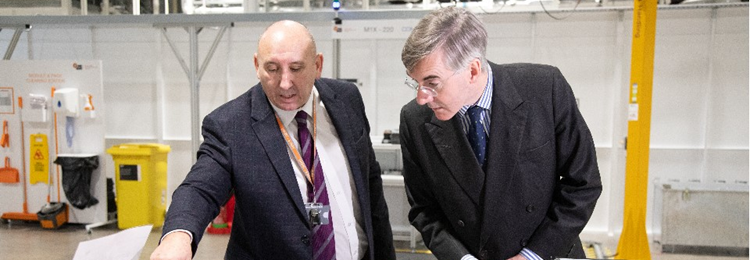
Record funding uplift for UK battery research and development
Date: Thursday 20 October 2022
The UK’s world-leading manufacturing industries will be boosted thanks to £211 million in new government funding for battery research and innovation, Business Secretary Jacob Rees-Mogg confirmed today (Friday 21 October).
The record funding uplift will be delivered through the Faraday Battery Challenge, which began in 2017 and supports world-class scientific technology development and manufacturing scale-up capability for batteries in the UK. It will help to seize on opportunities for private investment and economic growth in industries where powerful, fast charging batteries will be essential – such as domestic energy storage and electric vehicles.
The funding, from last year’s settlement, will be delivered between 2022 and 2025 by UK Research and Innovation (UKRI) with support from the Faraday Institution, Innovate UK and the UK Battery Industrialisation Centre (UKBIC).
It will help the sector deliver 100,000 jobs in battery gigafactories and the battery supply chain by 2040. Supporting the scale-up of these technologies and unlocking further private investment supports the sustainable growth of the economy, which will boost tax revenues and put public services on a more secure footing for the longer term, helping improve life for people across the UK.
Speaking on a visit to the £130 million UKBIC, which is the UK’s centre of excellence in battery manufacturing, Business Secretary Jacob Rees-Mogg said:
Safe and powerful batteries are central to our plans to grow the industries of the future. From our world-leading renewables industry, to our growing electric vehicle sector, secure supplies of batteries are key to delivering jobs and prosperity.
The Faraday Battery Challenge has brought the UK’s greatest minds and best facilities together to develop the innovations that will help us achieve this goal. The work it has done since 2017 has laid the groundwork for our future economic success and I am pleased to confirm this work will continue, supported by record funding.
The Faraday Battery Challenge combines:
- research and capability development to reduce battery weight and cost, increase energy and power, and ensure reliability and recyclability;
- collaborative business-led innovation in the UK battery sector, development of the wider network and skills needed to manufacture batteries through Innovate UK; and
- manufacturing scale-up & skills development at the UKBIC the national battery manufacturing development facility.
The Challenge has supported over 140 organisations working across the UK, attracting over £400 million in further private sector investment. It has enabled the Faraday Institution, the UK’s independent battery research body, to unite 500 researchers across more than 25 universities to improve current and develop future battery technologies.
Along with the Challenge, the UK government is helping to deliver a world leading electric vehicle industry for the UK through the Automotive Transformation Fund (ATF). Through the ATF the UK has secured major investments in battery production, including Envision AESC expanding their existing plant in Sunderland.
A further £4 million is also being announced through UKRI’s Driving the Electric Revolution Challenge to support skills, talent and training across Power Electronics, Machines and Drives (PEMD) manufacturing and supply chains. PEMD components are the parts that make things ‘go’, from cars to hairdryers, underpinning a wide range of high-value industries.
